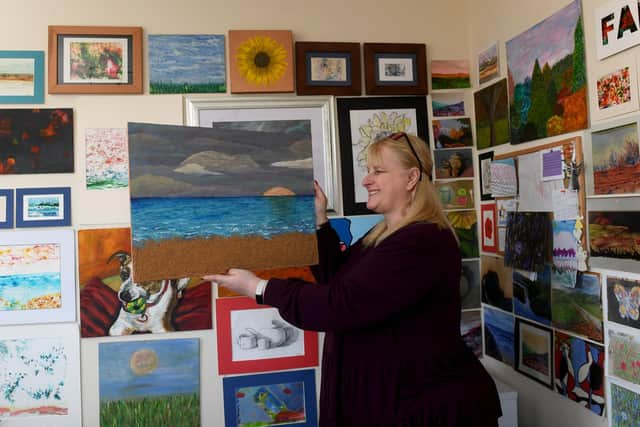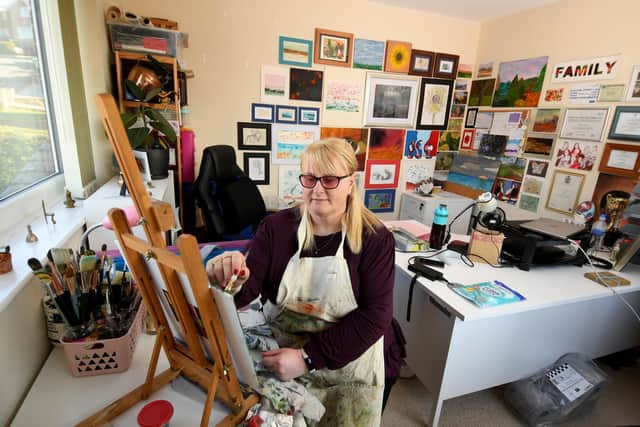Woman who was told by doctors she would never work again reveals how art changed her life
Debs Teale credits art classes with saving her life and ultimately changing it beyond recognition. For the 53-year-old, the sessions went far further than teaching her how to draw; they helped to put her in control of her own health and wellbeing and they taught her how to live.
Just over a decade ago, Debs was heavily medicated on more than 20 tablets a day, often bed bound and reliant on her three daughters as carers, as her mental health plummeted.
Advertisement
Hide AdAdvertisement
Hide AdShe had been in and out of mental health services from the age of eight and recalls how she had been told by a psychiatrist “you’re always going to be ill, you’re always going to be medicated and you’ll never work again”. “I’d no reason to doubt what he said,” she continues, “but by the same token, I felt like I’d been given a life sentence and I didn’t want that.”


Debs ended up in hospital after attempting to take her own life. “I woke up opposite a lady who was dying of cancer, who had no time for me whatsoever. She’s clinging to her life and she sees me willingly wanting to give mine away but I was so jealous of her because she was getting an end to her suffering whereas I was being forced to live with mine. All they could do was give me more medication and keep me in services and to me that wasn’t any way to live.”
As part of her discharge plan from hospital, Debs was to attend psychological services and whilst sat in the waiting room waiting for an assessment, a leaflet caught her eye. It was for a charity, hosted by the South West Yorkshire NHS Foundation Trust, called Creative Minds, which was running an art for wellbeing scheme.
She went along, initially to a taster session, coming up 11 years ago in December 2011. “That’s the day my life changed,” she says.


Advertisement
Hide AdAdvertisement
Hide AdDebs, who lives in Huddersfield, has now been off medication for nearly a decade and out of mental health services for more than six years. She has sold over 160 of her paintings and has had her work on show in a United Nations international art exhibition.
With lived experience, Debs advocates for creativity as a way to manage health and wellbeing and highlights the importance of voice and choice within people’s care. She is now the Lead Peer Support Development Coordinator at the South West Yorkshire Trust, a trustee for The National Centre for Creative Health and has recently completed a master’s degree in mental health recovery and social inclusion.
“It’s really incredible to have this voice now and to be valued for that,” she says. “I always felt like an invisible service user who didn’t have a voice.”
Debs also gives talks about her journey, including to the World Health Organisation, and is a member of the Social Prescribing Network. March 10, is Social Prescribing Day, and
Advertisement
Hide AdAdvertisement
Hide AdDebs has a clear message. “If you can fund social prescribing, fund it,” she says. “I think we need to look more creatively about what we do with people within mental health and how to connect them up to a community.
“One of the first things you do when you’re ill with your mental health is you isolate yourself. You don’t want people to see how ill you are, you don’t want to infect them with your sadness and how you’re feeling. So we need to look at connecting people up to a community, not focusing on their illness but instead on what they enjoy, on something different.”
Social prescribing is a non-clinical way of helping people to get more control over their health. Social prescribing link workers take referrals from local agencies and help individuals connect with a range of activities typically provided by voluntary or community organisations, including things like the arts, cricket, swimming, gardening, cookery and learning projects.
It can benefit a range of people including those with one or more long-term conditions, who need support with their mental health, who are lonely or isolated or who have complex social needs which affect their wellbeing. In the NHS Long Term Plan, the health service committed to building the infrastructure for social prescribing so that at least 900,000 will be referred by 2023/24.
Advertisement
Hide AdAdvertisement
Hide Ad“There’s no boundaries to social prescribing,” Debs says. Not only can it give a person a new interest, it can help them to socialise within their community and take the focus off any diagnoses they may have.
Looking back to that first art class, Debs says something inside her “ignited”. “Something just came alive and I really enjoyed it. I wanted to do more of it because it made me feel good...It also allowed my brain to stop. It made me aware that my racing track brain could be stopped and allowed me to control my illness and my thoughts rather than them controlling me. Nothing else had done that.”
“The conversation there wasn’t around my illness and my labels,” she adds. “It was around me and my life…That focus on something other than what was bothering me was a key factor.”
For Debs, one of the most powerful moments in her mental health journey was being shortlisted for an accolade at the Yorkshire Women of Achievement Awards in 2017.
Advertisement
Hide AdAdvertisement
Hide Ad“I didn’t want to walk in to applause from the crowd because I still live with my illness, I still have my anxiety. My girls persuaded me to and when I walked past the table they were stood at, the look on their faces was so powerful.
“They didn’t have to worry about mum anymore. There was a time when they were coming home from school not knowing what state I was in, not knowing if I was alive or dead, if I’d got up or functioned that day. So to see the look of pride on their faces was incredible. That was a real turning point for me.”
Debs still continues with her art now, with part of her home allocated as studio space. She was also recently asked to write a chapter in a book about inspiring women, which she says is a “stark contrast from being that invisible service user”.
“Recovery was never a word for me,” she reflects. “It was never thought about in my journey. I think of that woman laid in bed in hospital opposite that lady dying of cancer, how awful I felt, how guilty I felt that I’d failed, that I’d let my daughters down, my partner down, society down and how much I despised myself.
Advertisement
Hide AdAdvertisement
Hide Ad“I think of that person and then the person I am now who’s done all these magnificent things that weren’t even a dream. Recovery for me, it means living a life worth living.”
Support The Yorkshire Post and become a subscriber today. Your subscription will help us to continue to bring quality news to the people of Yorkshire. In return, you'll see fewer ads on site, get free access to our app and receive exclusive members-only offers. Click here to subscribe.
